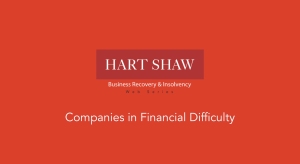Hart Shaw Business Recovery is reminding SMEs that revised fees for bankruptcies and company insolvencies will come into force on 16 November 2015.
Fees and charges are reviewed annually and the revised fee structure ensures that the cost of insolvency processes is paid for by those who use them.
The company winding up deposit – which needs to be paid to the Department of Enterprise, Trade and Investment – is set to rise by eight per cent to £1,350, whilst the company winding up administration fee will climb by five per cent to £2,520.
Christopher Brown, Business Recovery & Insolvency Partner, at Hart Shaw, a founder member firm of the UK200 Group said: “These changes will be subject to Parliamentary scrutiny, but the rise in fees is disappointing for SMEs. However, it is promising to learn that according to the latest figures from the Insolvency Service, there has been a fall in the number of company insolvencies in England and Wales over the last quarter.
“Some 3,539 companies entered insolvency in Q3 2015; a drop of more than ten per cent compared to Q3 2014. The decrease in compulsory liquidations mark a drop to the lowest level since 1989. In fact, the estimated liquidation rate in the 12 months ending Q3 2015 was less than half of one per cent of active companies, which is the lowest level since comparable records began in 1984.
“However, if you’re an SME owner that is worried about bankruptcy, insolvency and the associated fees, talk to an expert.”
Hart Shaw Business Recovery has a team of professionals that can assist in this area. To find out more, please contact Christopher Brown on 0114 251 8850 or chris.brown@hartshaw.co.uk.
Connect with Christopher Brown on LinkedIn
Watch Hart Shaw’s video on Companies in financial difficulty

